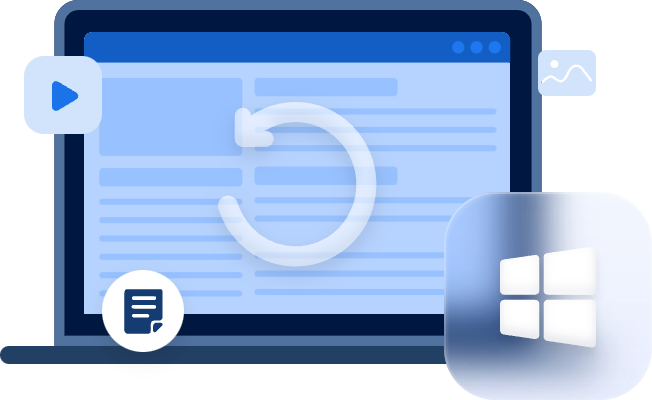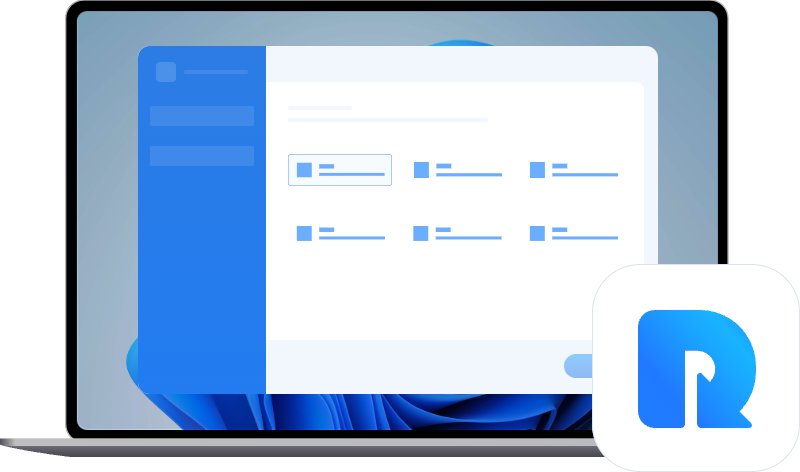Recover Data from Clicking Hard Drive (2024) - Best Ways
how to fix when your hard drive is clicking and making strange noises? Get possible ways to fix it and recover data from clicking hard drive on Windows computers.
Can you recover data from clicking hard drive?
I have an external HDD, which is about 2 years old, which is producing a clicking noise. The drive is also not recognized in the disk management utility but appears in the connected storage as BUP Slim. So, is there any possibility of recovering the data?
- Question from Tomshardware.com
Hard drives are common storage devices to save and transfer important data from one device to another. Usually, they have a large amount of storage space for securely saving data. However, the disk can get into trouble sometimes. The clicking and beeping sound is one of the problems. Hard drive clicking makes data rendering inaccessible. How to recover data from clicking hard drive?
Before trying the methods to fix clicking hard drive and perform clicking hard drive data recovery, let’s find out the meaning of hard drive clicking and the reasons for it.
What does a clicking hard drive mean?
When you heard your hard drive clicking, you’d better stop using it immediately. To know the meaning of a clicking hard drive, you need to know the structure of the hard drive first.
The physical components of a hard drive mainly include two parts: a magnetic platter and a magnetic head. The magnetic platter rotates thousands of times per minute. When it is working, the hard drive generates vibrations accordingly.
The magnetic head performs read and write operations on the magnetic platter. Sometimes, you will hear some clicking sound because the hard drive is reading and writing data at a high speed.
However, if your hard drive makes noise constantly, it’s not a good sign often. You need to get the device checked when the hard drive starts making noises and then perform HDD data recovery. There are some problems with your hard drive. Seriously, the hard drive will stop working sooner or later as a “click of death”.
What causes the clicking sound on hard drives?
Multiple reasons can cause hard drive clicking. Some of them can be fixed, while others may lead to a dead hard drive. If the clicking hard drive is damaged physically, it’s hard to fix. Here are four main causes for hard drive clicking.
- The data cable is damaged. Sometimes, the cables may be damaged, which causes unstable operations. The magnetic platter may not rotate at high speed, resulting in making clicking noises.
- Physical damages. It’s a common reason for hard drive clicking. Even a minor blow to your hard drive could lead to a deviation in the magnetic head. If the hard drive exposures to water or fire, it can cause physical damage.
- The preamplifier is broken. The preamplifier is a small component on the head of a hard drive to make the signal read easily by the head. But if the heat is too high, the preamplifier is easily damaged.
- Corrupted or scratched SA. System Area (SA) stores important parameters and useful information to help users utilize hard drives normally. Once it happens, a live PCB swap can help click hard drive data recovery.
How to recover data from clicking hard drive?
You may need to know how to recover data from clicking hard drive after knowing the reasons. Usually, hard drive clicking is a sign of a failing hard drive. You need different solutions according to different cases.
❌ Tips for clicking hard drive recovery
Before recovering data from a clicking hard drive, you need to notice some tips to protect your hard drive data.
Don'ts
-
Avoid knocking on the drive.
-
Do not place the hard drive in a freezer.
-
Avoid attempting to open the drive.
Dos
- Immediately cease all usage of the hard drive.
- Select a reliable data recovery application.
- Consult a reputable data recovery service center.
Case A: Hard drive clicking but still works
If your hard drive is clicking but still clicks, immediately stop using the hard drive, and use a professional data recovery tool to maximize your chances of data retrieval. You can try the freeware - MyRecover to restore deleted or lost data from clicking hard drive.

- Speed and efficiency: MyRecover delivers unmatched speed and efficiency for recovery.
- Comprehensive scanning methods: Both Quick Scan and Deep Scan are supported to recover lost dataor deleted data from hard drives.
- User-friendly interface: You can effortlessly follow the simple steps and retrieve your files with confidence.
- Powerful features: Support more than 200 file types to recover.
To try such a data recovery tool, please follow the easy tutorial now:
Step 1. Launch MyRecover and hover the mouse over the partition that stores the deleted or lost files. Click Scan.
Step 2. The software will scan the partition at a fast speed with a quick scan and deep scan. You can recover the data you want during scanning.
You can click use Filter to display only the file types you want:
- Name: Enter the relevant filename of your desired files to quickly locate them.
- Date modified: Set the date (today, yesterday, last 7/30 days, etc.)
- Size: Set file size (<128KB, 128KB~1MB, 1MB~512MB, etc.)
Step 3. Select the files and click “Recover XX files” to save the recovered data to another partition.
- You need to choose a new path for your recovered files from the clicking hard drive.
- MyRecover can help you recover files for free, up to 500MB. For unlimited data recovery, please upgrade MyRecover to advanced editions.
Case B: Hard drive makes a clicking noise and won’t boot
If your hard drive makes noise and can’t be recognized by the computer, it could be more serious than Case A. You can try the following possible ways to fix the clicking hard drive and get the data off the hard drive.
◈ Method 1. Check hard drive connection
- Check if the connection cable is damaged.
- Check if the power cable is loosened. You can try to unplug and plug the power cable again to connect the clicking hard drive to the computer.
- If your external hard drive is clicking, you need to check whether the connecting cable is compatible. For example, you may use a USB 2.0 cable to connect a USB 3.0 external hard drive.
◈ Method 2. Connect the clicking hard drive to another computer
You could try to connect the clicking hard drive to another computer. If the clicking is an internal hard disk, you can use an adapter to connect it to the computer as an external hard disk.
◈ Method 3. Freeze the clicking hard drive
If the hard drive is overheating, it can make a clicking sound. Therefore, you could try to freeze your clicking hard drive. Stop using the computer and clear the fan. You can add an extra fan to cool down the hard drive, especially in the summer. When your hard drive works again, you need to clone your data immediately.
◈ Method 4. Ask for help from a data recovery service
If you suspect significant damage to your clicking hard drive, it's advisable to consult a data recovery service center. Experts in these centers employ specialized tools to open your clicking hard drive and repair the hard drive head. Moreover, data recovery service centers maintain clean room environments free from debris and air pollutants to preserve the integrity of your clicking hard drive.
Bonus tips: How to recover the entire clicking hard drive?
If your clicking hard drive is still accessible, you’d better prepare another external hard drive and clone the failing hard drive to it as soon as possible. Because the clicking hard drive will stop working at any time. And then you could try to fix the clicking hard drive.
There are many unmovable and hidden system files on the hard disk, you can’t copy and paste directly to transfer data. To clone the entire hard disk quickly, you could try a useful tool: AOMEI Partition Assistant.
AOMEI Partition Assistant is a cloning software to help users easily clone HDD and SSD. You can finish the hard disk clone to recover data from clicking hard drive with simple steps in Windows 11/10/8.1/8/7.
Step 1. Install and launch AOMEI Partition Assistant on your computer and click “All Tools” and “Disk Clone Wizard”.
Step 2. Choose “Clone Disk Quickly” in the pop-up window.
Step 3. Choose the clicking hard drive as the source disk and click “Next”.
Step 4. Select the destination disk to store the data from clicking hard drive. Click “Next”. You can tick "Optimize the performance of SSD" to improve the reading and writing speed of SSD if the destination disk is an SSD.
Step 5. You can adjust the partition size on the destination disk.
Step 6. After previewing the brief information about the disk clone, click “Apply” and “Proceed” to commit the disk cloning operation.
To keep your data safe, backing up your data is significant. Because data loss could happen at any time. You can try Windows features like File History or Windows Backup and Restore to back up your data safely. Alternatively, the freeware - AOMEI Backupper can be another good choice for your data security.


